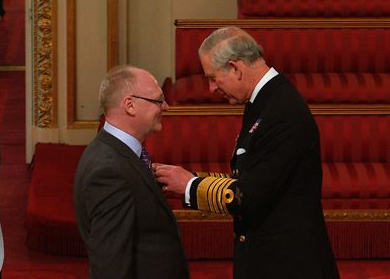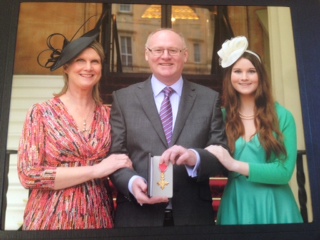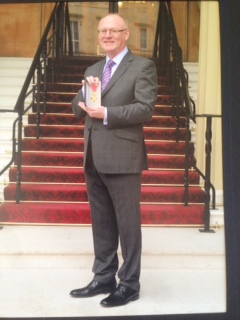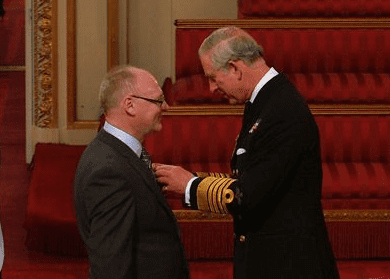Mark McGreevy, Depaul International’s CEO honored by Prince Charles.
 Mark McGreevy, Depaul International’s CEO receives his OBE (Order of the BritishEmpire) from Prince Charles. Mark was listed in this year’s honours list for his work with the homeless and he was accompanied by his wife and daughter to Buckingham Palace where he was presented with his award by Prince Charles.
Mark McGreevy, Depaul International’s CEO receives his OBE (Order of the BritishEmpire) from Prince Charles. Mark was listed in this year’s honours list for his work with the homeless and he was accompanied by his wife and daughter to Buckingham Palace where he was presented with his award by Prince Charles.
(Sr. Marie Gabriel Cubitt, DC of Australia is also a recipient ot the OBE. FamVin story)
The award marks 25 years of service in a sector which Mark has helped to shape. Depaul has grown from a small London-based charity in 1989 to an international NGO now working in six countries helping over 13,000 disadvantaged and marginalised people a year. In an interview, Mark describes how the homelessness landscape has changed since he first started out in the sector and his aspirations to help deliver a co-ordinated global response to homelessness.
How did you feel when you received news of your O.B.E?
 When a letter dropped through the door last November announcing that I’d been awarded an OBE for my work as head of Depaul I was both surprised and pleased; surprised that I’d been singled out and immensely proud to see the organisation validated and the work of all its staff recognised. The first people I shared the good news with of course were my mum and dad and my wife, Sarah.
When a letter dropped through the door last November announcing that I’d been awarded an OBE for my work as head of Depaul I was both surprised and pleased; surprised that I’d been singled out and immensely proud to see the organisation validated and the work of all its staff recognised. The first people I shared the good news with of course were my mum and dad and my wife, Sarah.
How did you end up starting Depaul and what was your background before?
I started out as a teacher with a degree in theology at Westminster Choir School. At the same time I started to volunteer at The Passage, a homelessness service in Victoria , where I helped with serving food and clearing up afterwards. The whole experience made me realise I was perhaps more suited to working with homeless people rather than children and in 1988 I started as a project worker at a hostel run by the Cardinal Hume Centre. I stayed in this role for nearly 2 years until 1989, when Cardinal Hume created the Depaul Trust. I was asked to be part of the initial team to help set up the organisation.
What have been the biggest changes you’ve seen across the organisation over the past 25 years?
Back in 1990 homelessness charities were very different – they were largely run by volunteers. Volunteers were a mixed and eclectic group. Some came from religious orders, others were people who’d left business . There were no homelessness professionals as such, originally people came from lots of other different backgrounds. There was a real sense of mission as we began to work together, almost as a movement to improve the lot of the homeless. There has been a gradual professionalisation of the sector since its early days. Depaul has developed from being a London-based charity to being UK-wide and international. We continue to uphold the vision of St Vincent de Paul who, four hundred years ago, set out to help “the poorest of the poor”.
 What has been your most memorable moment at Depaul?
What has been your most memorable moment at Depaul?
The most memorable moment was in 1990 when Princess Diana came to open our first project. A lot of hard work went into turning an old convent building in Willesden into a hostel for young people in just 6 weeks. 25 young homeless people arrived and Princess Diana opened it with the paparazzi and TV crews attending from all over the world. It was a special occasion and the hostel, still open today, has accommodated hundreds of young people in need over the years.
What has been the most important professional achievement at Depaul?
Innovation – how we have looked at new ways to tackle old problems. Nightstop, a Depaul UK project, is an incredibly innovative way to help young people in need without institutionalising them. It offers them the chance to stay with a family when they have nowhere to go. We’ve changed the attitude of the sector and the government towards working with homeless people.
In Ireland, we challenged established perceptions and thinking by providing wet-shelters for dependent alcohol and drug users. Accepting the homeless with their addictions was ground-breaking when Depaul pioneered the first projects. It is now the accepted way of doing things.
What remain some of the biggest challenges for Depaul’s work?
Homelessness is growing globally. Across the world 1.3 billion people are living on the street or in unsuitable accommodation; 100 million have no accommodation at all. Urbanisation is increasing, 3.6 billion people live in cities and it’s estimated that by 2050 this will increase to 6.3 billion. Our challenge is in how we influence policy makers to deal with what will be a rise in homelessness globally. The next few decades will see the urbanisation of China, Latin America and Africa. Our challenge is in how we can share best practice globally.
To meet the problem of growing global homelessness head-on, Depaul in collaboration with DePaul University Chicago has set up the Institute of Global Homelessness. This resource brings together leading academics and is the first project of its kind to aim to develop a methodology to count global homelessness and provide a definition of homelessness.
Where do you think or hope Depaul will be in 25 years time?
 I would like Depaul to be leading the debate on homelessness and for us to expand our services into other regions. We will continue to provide quality services that are responsive to needs on the ground.
I would like Depaul to be leading the debate on homelessness and for us to expand our services into other regions. We will continue to provide quality services that are responsive to needs on the ground.
After 25 years what keeps you motivated every day?
I’m lucky in that I get to travel around the world to see our projects on the ground but I see the real needs of individuals who have nothing, whose lives are in crisis and chaos and it brings it home how much we still need to achieve and change, for people who are homeless. I have just come back from Ukraine where there are an estimated 1 million internally displaced people because of the civil war. In Odessa we use a bus as a space where the homeless can come and get food and medical care. What is great is how staff give hope to people who have lost everything.
What does the year ahead hold for you and Depaul?
I’ll pick up my medal and then I’m back on the road! We’ll see the expansion of Depaul into one more country this year and there’ll be a conference in Chicago to mark the establishment of the Institute of Global Homelessness. This coming year is also the 10th anniversary of the charity in Slovakia and Ukraine, so it’ll be a busy time but one which will see us expanding our reach to serve even more young people and adults in need.







0 Comments